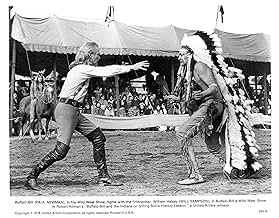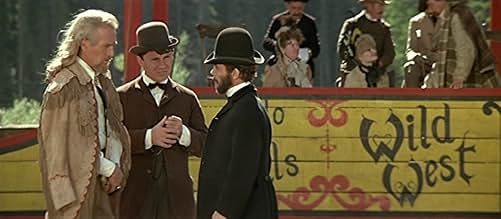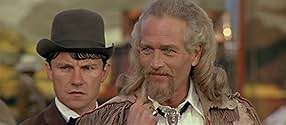Buffalo Bill and the Indians, or Sitting Bull's History Lesson
A cynical Buffalo Bill hires Sitting Bull to exploit him and add his credibility to the distorted view of history presented in his Wild West Show.A cynical Buffalo Bill hires Sitting Bull to exploit him and add his credibility to the distorted view of history presented in his Wild West Show.A cynical Buffalo Bill hires Sitting Bull to exploit him and add his credibility to the distorted view of history presented in his Wild West Show.
- Director
- Writers
- Stars
- Awards
- 1 win total
- Prentiss Ingraham
- (as Allan Nicholls)
- Oswald Dart
- (as Robert Doqui)
- Director
- Writers
- All cast & crew
- Production, box office & more at IMDbPro
Featured reviews
All of Altman's films have the feel of coming together in the editing room, and many times this approach to structure results in inspired moments, but "Buffalo Bill" feels even more than usual like a film without a center. There's no narrative thread to hold it together, so it has a wandering and monotonous quality. Also, it doesn't help that Altman's shooting style is uncharacteristically distant. There are virtually no close-ups in the entire picture, so scene after scene is photographed in medium and long shots. Both the screenplay and the camera keep us at a distance; as a result, we never become engaged in the action.
A definitive misfire.
Grade: C
Performance-wise who knew that Harvey Keitel was in this movie at all? He gives a memorably tiny performance, low key and inconspicuously funny as heck. Joel Grey plays one of the parts that would be given to Bob Balaban in more recent years, not really adding much to it. Burt Lancaster gives rich character to essentially a narrator and commentator. Newman's performance doesn't unbalance this film nearly as much as it did Altman's `Quintet' (both genre-wise and scriptwise, it was almost a character study), but it does show why Altman is more successful with a giant cast of B actors, or one main character that is content to listen and react more than speak, than with superstars.
The stage play is much much different. It focuses much more explicitly on the atrocities and hypocrisies committed. Sitting Bull speaks, quite a bit, and believes Buffalo Bill to be his friend. Buffalo Bill is ineffectual, and the one person most responsible for the extinction of the Buffalos the Indians once hunted (it would have been nice if they'd at least mentioned how he got the name Buffalo Bill, he killed thousands and thousands). Of the two, I prefer the movie, but wish Altman had shown a little more responsibility toward historical record.
This is a confusing and complex movie, alternately very subtle and prone to brash sometimes annoying running gags (the mezzos singing in the background are particularly cloying) and it is no surprise that people didn't know what to think of it. I'm just glad it is out on DVD so people can see an excellent representation of it and make up their own minds.
We meet a fantastic cast of characters, played by many of the best actors around giving wonderful performances. Among them are Joel Grey, Kevin McCarthy, Burt Lancaster, Harvey Keitel (really playing against type as Bill's goofy, childlike nephew), and Geraldine Chaplin (as Annie Oakley). Everyone, including Buffalo Bill himself, is deftly characterized in a very Altmanesque way. They wander through a semi-story, often seen and heard only in glimpses. Chaplin in particular, who gives probably the most memorable performance in the film, has very few lines. Mostly she characterizes Annie through her face. The Wild West Show is becoming more and more popular, and grossing more and more money. Their newest attraction is Sitting Bull, the man who famously defeated George Custer at Wounded Knee several years earlier. To have Sitting Bull for his show makes Bill extremely proud. In his mind, he has now defeated and subjugated the one Indian who really gave the white man a run for his money, and, by doing so, he has single-handedly tamed the West. Unfortunately for him, Sitting Bull is no subject. He has only joined the show because he has dreamed that, if in the show, he would get to meet President Grover Cleveland. We only once see Sitting Bull speak, when he attempts to talk to Cleveland. The rest of the time, his servant, Halsey (Will Sampson, from One Flew Over the Cuckoo's Nest), speaks for him. While he's participating in the show, he wants to change it in order to make it more factual.
Altman's detractors will have a field day with Buffalo Bill and the Indians. The biggest complaint against the director, as it seems to me, is that he is overly cynical and hates his characters. I'll admit that that is sometimes true, but I also think that the detractors see that aspect where it just doesn't exist. It does exist in this film, however. Buffalo Bill is most certainly a target for derision. Most of the action in the film revolves around the man being humiliated by Sitting Bull. Bill thinks he's the greatest adventurer who ever lived, and the film delights in having him showed up by the Sioux chief. I do not believe that it is an artistically invalid to have a character as the central target of a satire. Network, made the same year, has Faye Dunnaway, for instance. Who can like her by the end of the film. The difference is, I suppose, that Dunnaway wins some pathos by the end of the film. Maybe that's a difference, anyway. Buffalo Bill might have a bit of it by the end of the film, I think.
The character of Buffalo Bill is a wonderful satirical target because he really exists in such a state of absurdity. Once a genuine American military hero, Bill Cody wrapped up his entire experience and put it inside a bottle. In that bottle, the Wild West grew more and more fantastic, and less and less real. The environment is controlled, the goings on are fake, and any bit of history is freely created. It's not unfair, I suppose, to say Buffalo Bill and the Indians has a somewhat simplistic revisionist history behind it, but, in a big way, it is itself about revisionist history. Buffalo Bill Cody was revising history, creating entertainment out of true, historical human misery. And that's not only the suffering of the Native Americans, which is at the forefront of the film, of course, but also white settlers. The film begins with a rehearsal of an Indian raid on homesteaders. The bigger message is that was what Hollywood did, as well.
Bill likes his world, loves it, in fact. It is a celebration of his ego (the film often focuses on the gigantic portraits of Bill, which certainly would garner much criticism from some people and I would agree that it's not particularly subtle, but I would also say that it is pretty funny at times). Sitting Bull, one of the greatest Indian leaders and, from most accounts, an enormously clever and skilled man, completely undermines Bill's superiority as soon as he arrives. A blowhard as big as Buffalo Bill deflates pretty easily. Sitting Bull's presence also works to make Bill finally look around himself and begin to question the false world he has erected around himself. This thread of the film is resolved, at least as regards the narrative, in the climactic sequence, where Bill encounters Sitting Bull in a dream. This sequence is probably the low point of the film, I think. It more or less spells out everything that the film has been building to, and it doesn't really accomplish anything new. We know Altman for his amazing and original climaxes, and this one is certainly not one of his best. Still, it does work in a strictly functional way, and it is followed by a truly interesting and exquisite final sequence. This final sequence, which I won't discuss in this review, is not merely restating what has already come before, as I believe many viewers will take it. This, I think, is where the character of Buffalo Bill claims his pathos. Paul Newman's eyes in that final close-up are both frightening and quite sad, in any number of ways. Any film as shallow as many people like to claim this one is would never have given rise to this much depth in one man's expression. If you watch it and don't see it, I really think you've missed the point.
Even if you don't buy into the content of Buffalo Bill and the Indians, it's hard to imagine being unimpressed by Altman's direction or any of the other technical aspects of the film. Many claim it to be a bore, but I think Altman was just light years ahead of his audience at times. It's very entertaining and especially very funny at times. There are any number of masterful sequences. In my opinion, it is second in achievement only to Nashville.
The two biggest flaws, though, are these: Compared to most of Altman's films, much of the dialogue in this movie is very "stagy" and theatrical. I suppose it's supposed to be that way because of the questions of "myth" and "legend" that the story concerns itself with, but my impression was that such theatrical-sounding dialogue didn't mesh well with Altman's typically naturalistic style of filming.
The other problem I had is that the whole subject matter -- myth vs. reality, history vs. reality, show business vs. reality, etc. -- isn't really explored with any depth or subtlety. We're constantly being reminded that Buffalo Bill is a man who created his own legend out of lies, and that that is the basis of modern show business to this day, but really, that just didn't strike me as being a particularly insightful observation. This is hardly the first movie to point out that lies are often more "real" (or more attractive) than the truth, and Altman doesn't seem to bring anything new to the table.
Still, it's Altman, which means it's well-made, entertaining and beautiful to look at. I don't think this will ever be considered one of his major works but it's certainly worth a look.
"Tell Joy not to get on the horse in back," mutters the show's MC, Salisbury (Joel Grey) regarding an actress playing a white woman abducted by Indians. "It looks fake. We're in the authentic business." Later, Salisbury shoots down a band's idea of real frontier music as "too Ukrainian."
All this is easy to miss when so much is going on at once, while horses nearly run down a pedestrian in the foreground. This is a Robert Altman film, after all, or "Robert Altman's Absolutely Unique and Heroic Enterprise of Inimitable Lustre!" as it bills itself.
As Jeff Lebowski might say, Altman's not into that whole brevity thing here. A two-hour extravaganza, "Buffalo Bill" stars Paul Newman as Bill and makes its points about how show business and American mythmaking became one with repetitive, haymaker swings. The end result is a comedy that's not that funny and a social statement that's not that convincing, but Altman's secret sauce of a busy camera and piquant performances makes for a pleasant if shapeless affair.
Newman's something of a disappointment, giving less a performance than a caricature. I get the feeling he was directed by Altman to just play a slightly older and more pompous Hud with a goatee. He fills out Bill by drinking rotgut from a schooner, loving and spurning a succession of opera singers who never stop singing in frame, and watching over his stardom with a kind of prissy defensiveness that belies his self-cultivated frontier image. He can be a joy to watch still, working his eyes and playing to his mirror, maybe winking at the audience about what they expect from him as both Bill and Paul. If only he had better material.
"You ain't changed, Bill."
"I ain't supposed to. That's why people pay to see me."
There's also the business of his dealing with the Wild West Show's newest star attraction, Sitting Bull (Frank Kaquitts), which gives the story much of its social perspective. Bill thinks of Bull as an ungrateful pet who needs cultivation in "the show business," while Bull thinks Bill sells lies in the guise of history. Hence the "history lesson," which feels shoehorned in from a more socially committed source play. Altman wants to tell that story, but most times he'd rather have fun with the show-making part, and while you are watching this, you wish he'd cut loose and do just that.
The film succeeds in short bursts, though the eccentric casting choices Altman throws at you here don't work as well as they did in his other films. Geraldine Chaplin as Annie Oakley? Harvey Keitel as Bill's nerdy nephew? Some Altman vets like Robert DoQui and Allan F. Nicholls are barely in the film while stars like Newman, Keitel, and Burt Lancaster get longer spotlight time. John Considine is fun as Annie's flinchy husband, "the handsomest human target in the West," though that running joke, like so many others, is plugged more times than one of Annie's nickels. I was impressed also by Kevin McCarthy's publicist character, not only for the juiciness of his grandiloquent performance but the magnitude of his handlebar mustache.
"Buffalo Bill" takes a lot of time saying a good deal less than it thinks. But the spectacle of "the show business" and the minor bits of Altman kookiness and sardonic commentary around the edges keep this a diverting if underfilling entertainment.
Did you know
- TriviaThe full-length portrait of Buffalo Bill astride his horse, that appears several times in the film, is based closely on a similar portrait by the French artist Rosa Bonheur, which hangs in the Buffalo Bill Historical Center in Cody, Wyoming.
- GoofsSitting Bull joined Cody's show in 1885. The performing arena shows several Wyoming state flags, but Wyoming wasn't granted statehood until 1890, and that flag wasn't adopted until 1917.
- Quotes
William F. 'Buffalo Bill' Cody: My daddy was killed tryin' to keep slavery outta Kansas.
Oswald Dart: How'd he do that, sir?
William F. 'Buffalo Bill' Cody: Well, my daddy hated slavery with such a passion, that rather than let the coloreds get in to becomin' slaves, he just fought to keep 'em all out of the state.
- Crazy creditsRobert Altman's Absolutely Unique and Heroic Enterprise of Inimitable Lustrel
- ConnectionsFeatured in Luck, Trust & Ketchup: Robert Altman in Carver Country (1993)
- SoundtracksQui sola vergin rosa
Composed by Friedrich von Flotow
From his opera "Martha"
Performed by Evelyn Lear
Details
- Release date
- Country of origin
- Official site
- Language
- Also known as
- Buffalo Bill and the Indians
- Filming locations
- Production companies
- See more company credits at IMDbPro
Box office
- Budget
- $7,100,000 (estimated)
- Runtime2 hours 3 minutes
- Color
- Sound mix
- Aspect ratio
- 2.35 : 1
Contribute to this page























